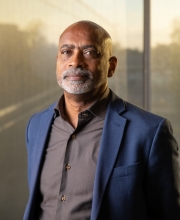 Ricky Bluthenthal, PhD understands the very visceral and emotional challenge of working on Human Immunodeficiency Virus (HIV) / Acquired Immunodeficiency Syndrome (AIDS) research in the early days of the pandemic that to date has claimed an estimate of 36.3 million lives. “Before 1996, HIV was a death sentence,” he says. “I had a lot of friends and acquaintances who passed–both sexual minority men or people who injected drugs or both.” These were the populations and people with whom Dr. Bluthenthal worked while he studied interventions around HIV transmission and prevention.
Ricky Bluthenthal, PhD understands the very visceral and emotional challenge of working on Human Immunodeficiency Virus (HIV) / Acquired Immunodeficiency Syndrome (AIDS) research in the early days of the pandemic that to date has claimed an estimate of 36.3 million lives. “Before 1996, HIV was a death sentence,” he says. “I had a lot of friends and acquaintances who passed–both sexual minority men or people who injected drugs or both.” These were the populations and people with whom Dr. Bluthenthal worked while he studied interventions around HIV transmission and prevention.
In his work, he found how marginalized people are often rendered invisible, or overlooked. “In this country we have this amazing capacity to ignore the suffering of others,” he says. “And that’s sort of been a through line in all of my research–trying to identify the problem areas so that there can be some focus on how to help people.” Identifying these challenges is part of where his passions lie today: “listening to people who have really serious problems and hearing what they need for their lives to be better.”
“Sounds kind of simple,” he says, “but at a societal level, we rarely ever do that, and certainly not routinely.”
Dr. Bluthenthal sees the immense potential for research to amplify the voices of people who are routinely ignored and overlooked in society and can serve as a powerful tool for advocacy. His studies in sociology, a Bachelor of Arts degree from University of California Santa Cruz and Masters and PhD from University of California Berkeley have, by serendipity, always centered around HIV and, thereby, intersected with public health. “I decided to get a PhD because I was excited about the potential of science to improve wellbeing among disadvantaged groups,” he says. “Then I was hired to do this HIV epidemiological study in the East Bay, and the rest is history.”
In the late 1980s and early 1990s, he began doing research around HIV transmission among people who inject drugs. And in 1992-1998, he ran a syringe service program, while earning his PhD at UC Berkeley. His research has always focused on harm reduction. His aim is not to merely track mortalities, but to conduct research on interventions that fundamentally improve people’s lives.
“What ends up happening is folks that find themselves in [positions of] power universalize themselves in the problem,” says Dr.Bluthenthal. “If it’s not a problem for them, then it’s not so much of a problem. So rather than try to solve the problem, they ignore it.” By conducting empirical research that shows the need for creating systems of wellbeing and care for people in need, there is a power shift in the narrative that the general public, politicians, and people in place of power can hear, and puts pressure on them to consider their responsibility to care for all people in their communities, while also demonstrate solutions that provide an actionable framework.
Dr. Bluthenthal’s current administrative role at the University of Southern California’s Keck School of Medicine overlaps a great deal with his social justice-focused research. As the Associate Dean for Social Justice, he oversees the school’s approach to advancing racial equity both internally and externally. And he is doing so at a crucial time in the nation’s realization of how embedded systemic racism is in all its institutions, especially the medical community.
As the inaugural Associate Dean for Social Justice at USC, Dr. Bluthenthal credits USC's Keck School of Medicine for recognizing the importance of centering social justice in medical education and the healthcare system in order to redesign healthcare so it is community-based and able to meet patients where they are. The murder of George Floyd in Minneapolis, MN on May 25, 2020 brought on an institutional realization at Keck School of Medicine that it’s not only external-facing work that needs to embody a social justice approach. “We’ve really pivoted trying to educate ourselves and our students about the legacy and institutionalization of structural racism and show how structural racism is a social determinant of health” Dr. Bluthenthal explains.
He sees all of this–his research, his work around structural racism in healthcare and within institutions of higher education–as important facets of the UC Global Health Day 2022 theme, Centering Social Justice in Community Health, where he will be one of the plenary speakers. His work and those of healthcare providers, researchers, and individuals working in global and community health spaces can contribute to the advancement of social justice through their work.
His talk at UC Global Health Day 2022 will highlight that centering social justice in community health is about prioritizing the people who need care the most by listening to their lived experiences to understand their needs, and collaborating with them to solve the problems that they know they are facing.
“Our political system has an enormous capacity to ignore disadvantaged and racially minoritized people,” says Dr. Bluthenthal. “The choice to let that suffering happen is a choice, it’s not inevitable. I’m interested in using my research in global health and social justice so that we can fix these problems, we just have to have the political will to implement the solutions.”
